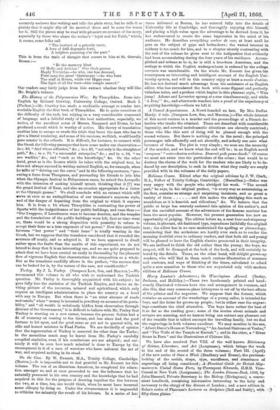The History of the Pelopomwsian War. By Thucydides. Done into
English by Richard Crawley, University College, Oxford. Book I. (Parker.)—Mr. Crawley has made a creditable attempt to render into readable English the first book of Thucydides. He is quite conscious of the difficulty of the task, but relying on a very considerable command of language and a faithful study of the best authorities, especially, we notice, of the excellent notes of Messrs. Sheppard and Evans, he has produced a result which is worthy of notice. His theory of translation enables him to escape or evade the trials that beset the man who has to give a literal rendering, and some of • his versions, weihink, would hardly pass muster in the schools. It is difficult, lot instance, to connect with the Greek the following passagesthat have come under our observation— in c. 40, "And whose adhesion," &c. ; in c. 42, "not only is the straightest path," &c.; in c. 70, " a successful enterprise," itc. ; and in c. 84, " we are warlike," &c., and "such as -the knowledge," &c. On the other hand, great as is the licence which he takes with the original text, he does not always succeed in writing natural English, as, for example, when he- alks of "driving out the curse," and-in the following sentence, "pro- curing-a force from Theogenes, and persuading his friends to join him when the Olympic festival in Peloponnese came, he seized the Acropolis with-the intention of making himself tyrant, thinkingthat it [7] was the grand festival of Zeus, and also an occasion appropriate for a victor at-the Olympic games." We shall -conclude with an extract-which will serve -at once as an exelnplifioatien of our translator's sonorous style, and of 'the danger of departing from -the original to-which it exposes him. It is from c. 10, where Thucydides is contrasting the power of Sparta withthe insignificance of her public buildings, and runs thus "For I suppose, if Iacechemcm were to become desolate, and the temples and the foundations of the public buildings were loft, that as time went on, there would be a strong disposition with posterity to refuse to accept their fame as a true exponent of her power." Now this antithesis between -"-her power " and "'-their fame " is totally -vvanting in the Greek, but we suppose that the-translator considered that it-rounded the sentence off neatly, and so adopted it. If we have appeared to dwell rather upon the faults than the merits of this experiment, we do not intend to deny that it is an interesting one, and we are quite prepared to admit that we have been carried on easily in the-reading by the pleasant flow of vigorous English that characterizes the composition as a whole. But as the translator candidly allows in the preface, "the success that can be looked for is, by the nature of the case, not considerable."






























 Previous page
Previous page